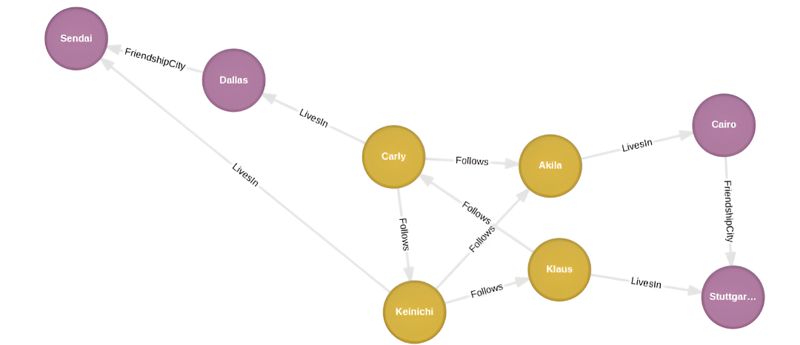Filter Data in a Graph Network: Cypher MATCH and WHERE
MATCH
The Rust code cited in this post comes from kuzu_match.rs. To run that however, you’ll need to execute kuzu_create_return.rs first in order to provision a graph database and populate it with with data. kuzu_create_return.rs need only be executed once. Both Rust programs work with the graph database created in /tmp/kuzu_db.
In the preceeding post we provisioned a graph network and populated it with nodes and relationships. There we saw how the Kuzu Explorer displays the graph as interconnected nodes. Alternately the browser can also presents the data in tabular form as we have here.

When we want to query for patterns in the database, we turn to Cypher’s MATCH clause. Because Cypher is a declarative language, we only need to supply the pattern and leave it up to the query engine to retrive the matching data.
MATCH (u: User {name: 'Carly'})
RETURN uWhen we run this query at the command line, Kuzu returns the matching record.
{_ID: 0:0, _LABEL: User, name: Carly, age: 31}WHERE and the AS Operator
In the preceeding post we also introduced variable labels for graph nodes. These come in handy for pattern matching in Cypher when we’re using Cypher’s WHERE clause. Combined with MATCH, the WHERE clause accepts node lables and properties as parameters for our query patterns, applying pattern filters that we supply.
MATCH (u: User)
WHERE u.name = 'Keinichi'
RETURN u{_ID: 0:1, _LABEL: User, name: Keinichi, age: 47Cypher’s pattern filters come with a number of logical operators. In the example below, we apply OR to expand the scope of the filtered match.
MATCH (u: User)
WHERE u.name = 'Keinichi' OR u.name = 'Carly'
RETURN u.name AS PERSONPERSON
Carly
KeinichiNote that we also used another Cypher operator in that last query: AS. The AS operator lets us introduce an alias for a variable reference to make the query result more readable.
In our final examples we run queries against a graph network loaded with a few more informationi. Our goal here is to use patterns that traverse the LivesIn and/or the Follows relationship(s) to link a user and a city.

MATCH (u: User)-[LivesIn]->(c: City)
WHERE u.name = 'Keinichi'
RETURN u.name AS USER, c.name AS CITYMATCH (c: City)<-[LivesIn]-(u: User)
WHERE u.name = 'Keinichi'
RETURN u.name AS USER, c.name AS CITYUSER|CITY
Kenichi|SendaiIn the first query above, we present two versions of the query, showing how flexible Cypher can be with relationship in the MATCH clause. The second query shows how we can chain nodes and relationships to retrieve useful information from the graph.
MATCH (u1: User)-[: Follows]->(u2: User)-[: LivesIn]->(c1: City)
WHERE u1.name = 'Keinichi'
RETURN u2.name AS PERSON, c1.name AS CITY, c1.population AS CITY_POPULATIONPERSON|CITY|CITY_POPULATION
Akila|Cairo|4493410
Klaus|Stuttgart|632865